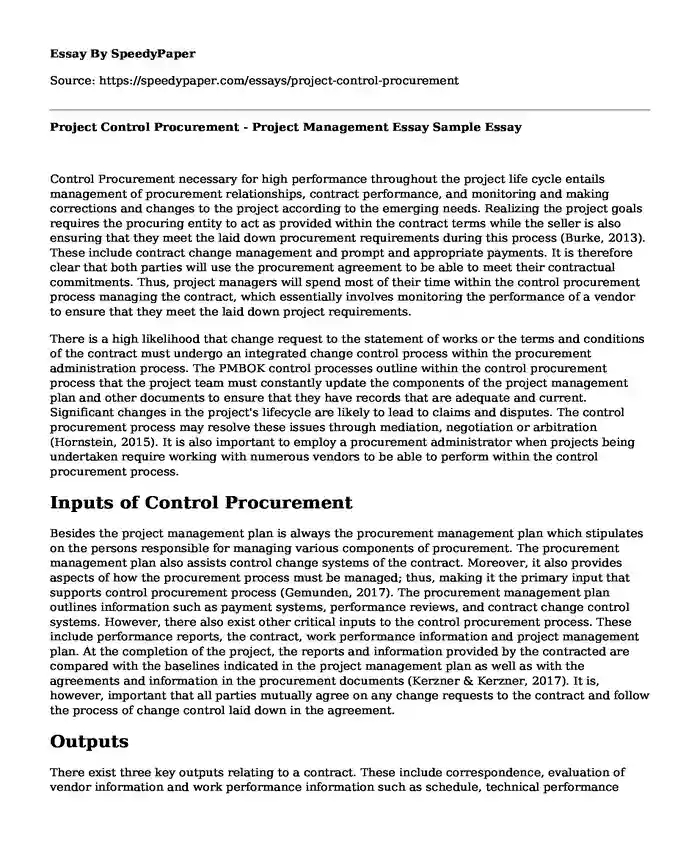
| Type of paper: | Course work |
| Categories: | Project management Contract |
| Pages: | 3 |
| Wordcount: | 702 words |
Control Procurement necessary for high performance throughout the project life cycle entails management of procurement relationships, contract performance, and monitoring and making corrections and changes to the project according to the emerging needs. Realizing the project goals requires the procuring entity to act as provided within the contract terms while the seller is also ensuring that they meet the laid down procurement requirements during this process (Burke, 2013). These include contract change management and prompt and appropriate payments. It is therefore clear that both parties will use the procurement agreement to be able to meet their contractual commitments. Thus, project managers will spend most of their time within the control procurement process managing the contract, which essentially involves monitoring the performance of a vendor to ensure that they meet the laid down project requirements.
There is a high likelihood that change request to the statement of works or the terms and conditions of the contract must undergo an integrated change control process within the procurement administration process. The PMBOK control processes outline within the control procurement process that the project team must constantly update the components of the project management plan and other documents to ensure that they have records that are adequate and current. Significant changes in the project's lifecycle are likely to lead to claims and disputes. The control procurement process may resolve these issues through mediation, negotiation or arbitration (Hornstein, 2015). It is also important to employ a procurement administrator when projects being undertaken require working with numerous vendors to be able to perform within the control procurement process.
Inputs of Control Procurement
Besides the project management plan is always the procurement management plan which stipulates on the persons responsible for managing various components of procurement. The procurement management plan also assists control change systems of the contract. Moreover, it also provides aspects of how the procurement process must be managed; thus, making it the primary input that supports control procurement process (Gemunden, 2017). The procurement management plan outlines information such as payment systems, performance reviews, and contract change control systems. However, there also exist other critical inputs to the control procurement process. These include performance reports, the contract, work performance information and project management plan. At the completion of the project, the reports and information provided by the contracted are compared with the baselines indicated in the project management plan as well as with the agreements and information in the procurement documents (Kerzner & Kerzner, 2017). It is, however, important that all parties mutually agree on any change requests to the contract and follow the process of change control laid down in the agreement.
Outputs
There exist three key outputs relating to a contract. These include correspondence, evaluation of vendor information and work performance information such as schedule, technical performance data, and costs. An organization will integrate these pieces of information with performance information produced in-house to produce reports in the control project work process and the monitor (Snyder & Dionisio, 2017). The contracting parties are likely to encounter multiple change requests during the contract performance period. The contracting organization will only be concerned with the changes that have a bearing on the terms and conditions of the contract (Project Management Institute, 1987). Therefore, in a case where the seller is making changes that do not influence the contractual obligation, there is no need to document such changes even if they are transparent to the buyer. Nonetheless, it is crucial for the project team to update the components of the project plan and project documents appropriately, as a requirement by all control processes, to maintain up to date and accurate records.
References
Burke, R. (2013). Project management: planning and control techniques. New Jersey, USA.
Project Management Institute. (1987). Project Management Body of Knowledge (PMBOK). Project Management Institute.
Kerzner, H., & Kerzner, H. R. (2017). Project management: a systems approach to planning, scheduling, and controlling. John Wiley & Sons.
Hornstein, H. A. (2015). The integration of project management and organizational change management is now a necessity. International Journal of Project Management, 33(2), 291-298.
Snyder, C., & Dionisio, C. S. (2017). A project manager's book of forms: A companion to the PMBOK guide. John Wiley & Sons.
Gemunden, H. G. (2017, August). Project Management Journal Has an Increasing Impact!. Project Management Institute.
Cite this page
Project Control Procurement - Project Management Essay Sample. (2022, Mar 14). Retrieved from https://speedypaper.com/essays/project-control-procurement
Request Removal
If you are the original author of this essay and no longer wish to have it published on the SpeedyPaper website, please click below to request its removal:
- Free Essay: Commercial Nuclear Energy in the United States
- Environment Perception Essay Samples
- Free Essay on Education
- Research Paper Sample: Depression among Prisoners
- Free Essay: Communication, Facilitative, Collaborative, and Teamwork Skills
- Essay Sample Focusing on Challenges to Interracial Marriages
- Essay Sample on Fredrick Douglass and Mary Wollstonecraft Similarities
Popular categories




